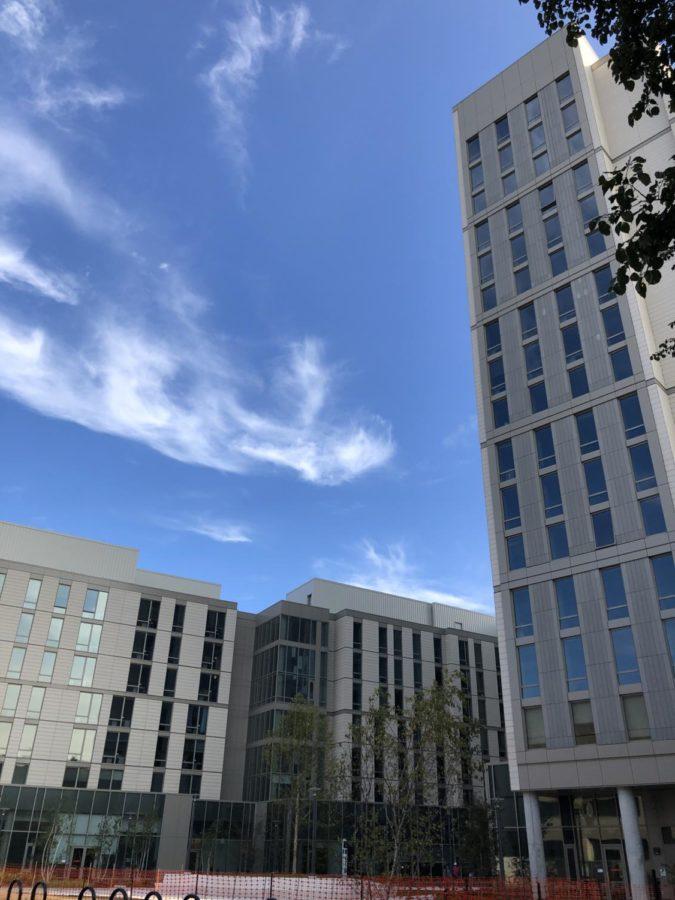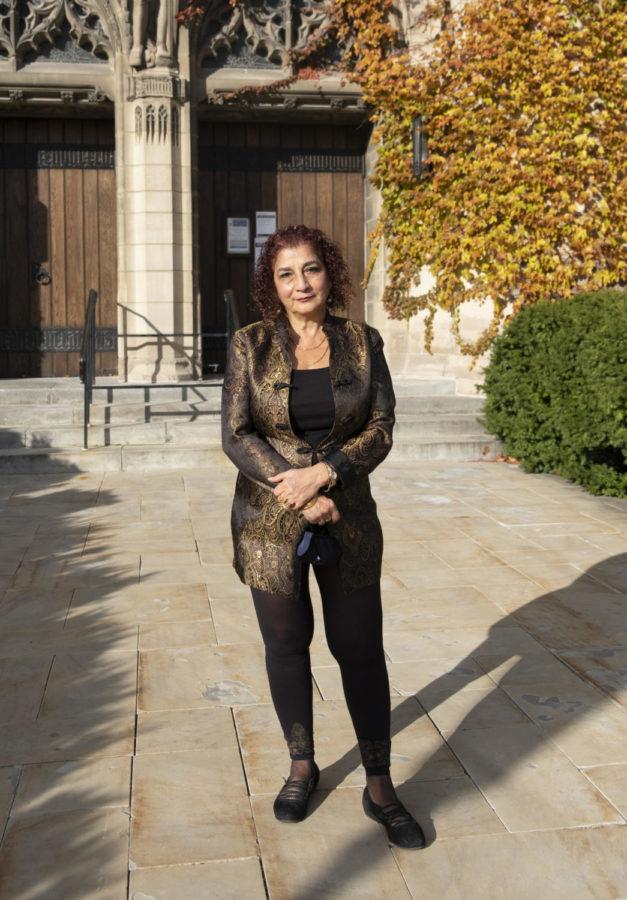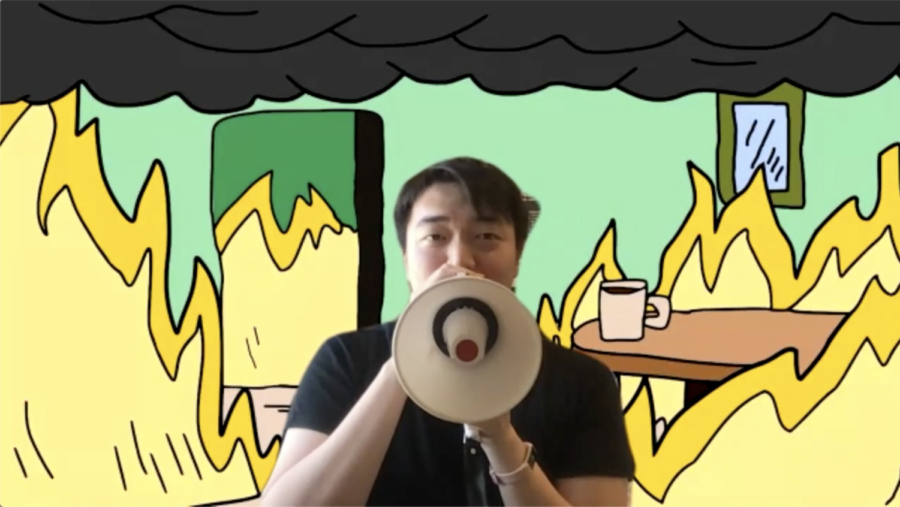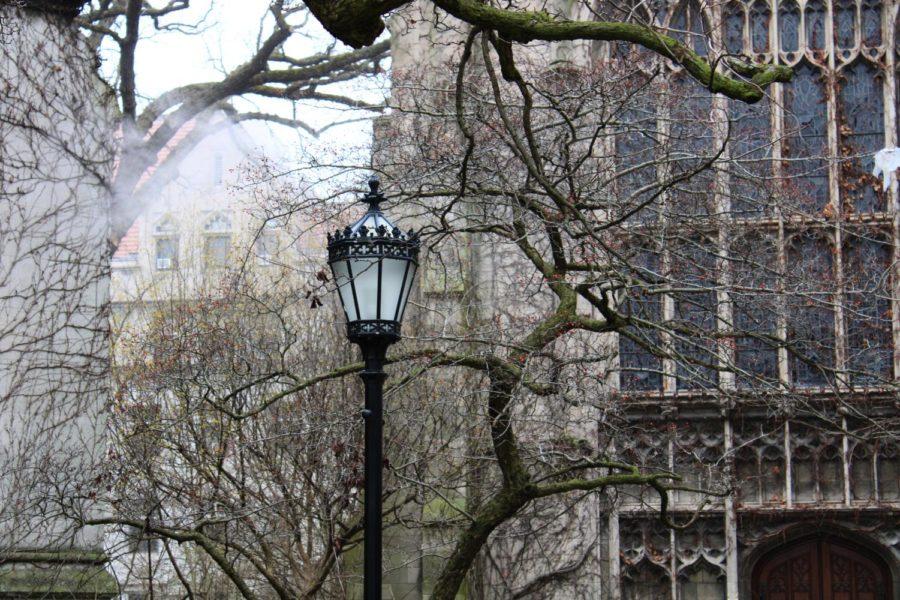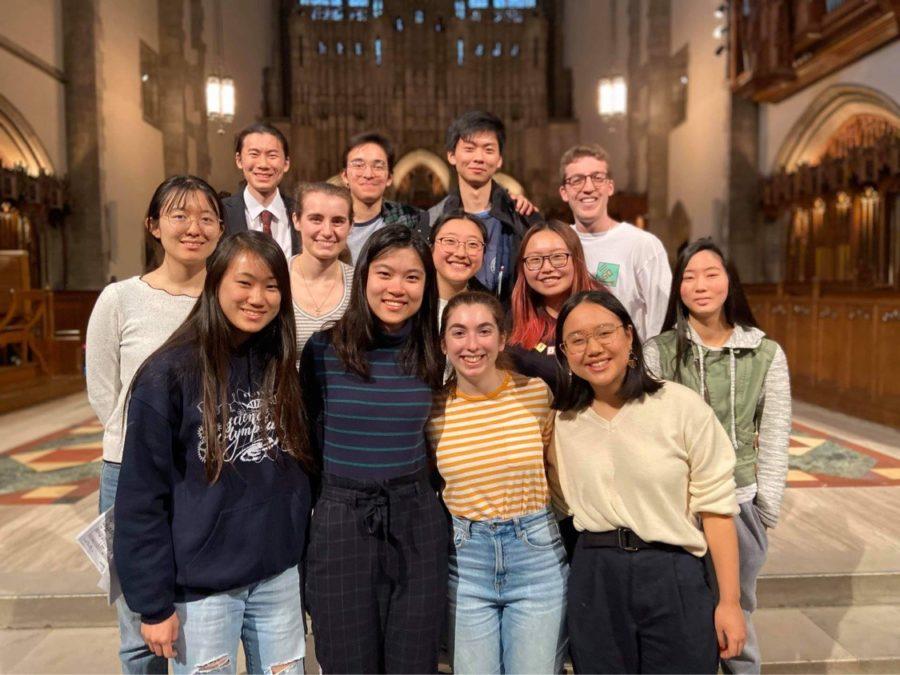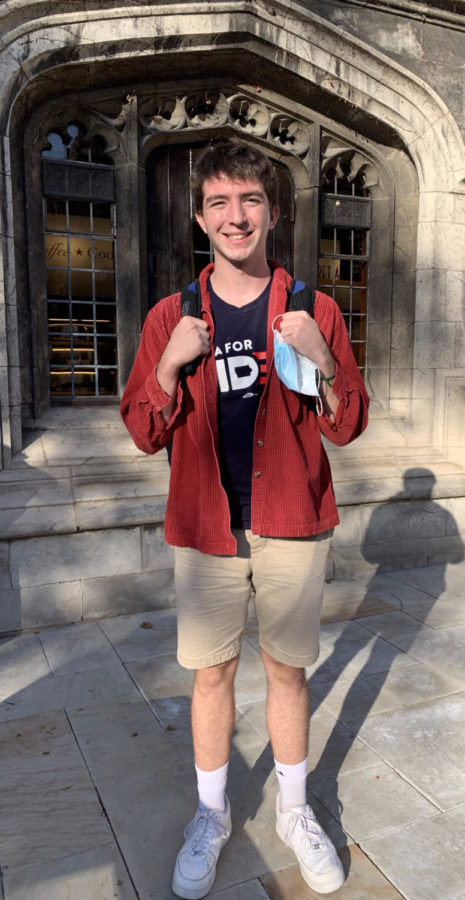Like the thousands who come each year to see the University of Chicago’s Gothic architecture, famed libraries, and arboreal landscapes, Class of 2025 member Natalie Larsen remembers being enraptured by her campus visit last March.
“I had the most amazing visit. I got to meet with students, and I went on the tour, and I just absolutely loved everything about it,” she said. “Visiting was definitely a huge factor in feeling like it was a community where I wanted to be.”
Larsen never had the opportunity to visit another college campus. Just a couple of days later, schools around the country closed as COVID-19 marched relentlessly across the globe. Meanwhile, at UChicago, classrooms emptied as students adapted to a virtual learning model. Those with hopes of becoming the College’s newest members were left on the outside looking in.
For members of the Class of 2025, the process of applying to UChicago has looked radically different due to the COVID-19 pandemic. In the eight months between the onset of the pandemic in the U.S. and the submission of their early applications, these students became guinea pigs for an admissions season like no other. The Maroon interviewed members of the Class of 2025 on their experiences.
Overcoming Physical Restrictions
For many students in years past, including Early Decision I applicant Larsen, the campus visit cemented UChicago atop their respective college lists. This phenomenon is not unique to UChicago: A survey conducted by researchers at the University of California, Los Angeles, showed that 47.3 percent of students starting college in the fall of 2017 considered the campus visit a “very important” factor in their college decision.
Since travel restrictions were enforced due to the pandemic, most opportunities to visit campuses and attend college fairs have been replaced by virtual tours and online networking platforms. Long-distance college trips in particular were curtailed by the travel restrictions brought about by the pandemic.
Jiahe Wang, who lives in New York City, was only able to visit New York University and Columbia University, but she found that the restrictions inspired her to look at schools beyond the East Coast.
“I think one thing that COVID has actually done is that I’m more willing to go to schools in other parts of the country [or] other parts of the world as well,” Wang said. “I would feel more comfortable choosing a school that I’ve actually visited, but since I didn’t really visit any, I was like, ‘Sure, I don’t really care where it is.’”
Summer opportunities like pre-college programs, camps, and internships were especially affected by the COVID-19 pandemic. While these offerings would normally provide fodder for an application essay, a few lines on a résumé, or simply good memories, they looked much different last summer—and were in some cases nonexistent.
Both of Larsen’s summer activities, an Arabic-language immersion program and an offshore-drilling internship, were canceled. “That was my whole summer that I didn’t have anymore,” she said. “But I did some virtual things. I started learning Arabic on my own, and I picked up other hobbies.”
While some programs, including many of those focused on academics, were converted to online formats for the summer, not all types of activities could be afforded that luxury. Wang was unable to frequent the art studio where she had worked, which made preparing her portfolio more challenging. “I do a lot of sculpture, like really large-scale stuff, like huge drawings and paintings, and that was a nightmare to do at home,” she said.
The pandemic also led to the cancellation of most sports competitions and upended the traditional athletic recruitment process. For many high school student-athletes, the recruitment timeline involves contacting coaches, meeting them at an unofficial campus visit, and sending them game footage, all before the student makes an official visit during their senior year.
Students recruited earlier during their high school careers, like women’s basketball recruit Bella Alfaro, had the chance to be watched by UChicago coaches before the pandemic hit. “I was lucky that they got to see me before everything happened,” she said.
After impressing the coaches at a tournament in summer 2019, Alfaro was invited to attend a basketball camp at UChicago that September, which allowed her to tour campus and see the athletic facilities. By the time recruiting activities intensified, however, COVID-19 had arrived on the scene, which meant most games had to be canceled. Her independent basketball team did not attend any tournaments last summer, so she had to rely on footage from her junior year to send to her future coaches.
“Going into my senior year, I was worried that COVID would impact my recruitment because coaches wouldn’t really be able to see me play. However, the coaches reassured me that they had seen me play before, they had all this footage from me, [and] they liked me as a person,” Alfaro said. “I just really learned about who they were as people—that they were willing to work with the different circumstances and everything wasn’t set in stone, so I really appreciated the flexibility.”
Students whose recruitment processes began later experienced more disruptions. It was only after a state tournament in Ohio was canceled in March 2020 that Cael Saxton, a recruit for the wrestling team, first communicated with head coach Leo Kocher. As their talks developed, Saxton and his family were able to meet Kocher off campus over the summer, and on December 1, after submitting his early decision application, he received a likely letter from the University.
Because of the shorter timeline of his recruitment, Saxton was not able to see the campus or the wrestling room, but that did not stop him from forming connections with his future teammates. “I had a couple guys on the wrestling team read over my application and help me with the essays. So that was really nice in gaining a perspective from [current students],” he said.
The New Role of the College Counselor
School counselors have long played an integral role in assisting students with the college application process. A 2013 report by the College Board revealed that high schools having an additional school counselor could increase their enrollment rate at four-year colleges by 10 percentage points. But maintaining a low counselor-to-student ratio has proven challenging, and at a number of high schools, counselors were among the first staff members to be laid off during a budget shortfall, according to the report.
The financial precarity in which schools have found themselves this year has resulted in mass layoffs, with about 350,000 high school and university employees in the United States let go in September 2020 alone. Although none of the students who spoke to The Maroon reported their counselors being laid off, the ways they have received guidance have changed in a mostly remote environment.
At Mira Loma High School, a public school in Sacramento, Chirag Kawediya struggled to get support from the college counseling staff. Scheduling meetings became more difficult, as counselors directed their efforts toward students in greater need of assistance.
“I barely got to interact with [my school counselor] because of COVID.… Normally, she tries to schedule kids in [for appointments] all the time, but she couldn’t do that,” he said. “I had to reach out…and set up Zoom calls on my own.”
Because of the high counselor-to-student ratio at many high schools, even before the pandemic, a number of families have turned to independent counselors for additional guidance. Kawediya’s private counselor helped him with applications to out-of-state schools. Although their consultations became remote due to COVID-19, Kawediya said the experience of working with his counselor “ended up being pretty much the same” as before the pandemic.
Other students found that COVID-19 made it easier to connect with their counselors. For Elisa Wyke, a Class of 2025 member who attends Katy-Westpark High School within the International Leadership of Texas charter school network, the switch to a remote environment meant she had access to several counselors, not just the counselor to whom she had been assigned.
The additional access proved invaluable: Wyke thought of an application essay topic while talking with one of the supplementary counselors, and she had multiple members of the counseling staff edit her essays. The support she received went beyond the application itself, including the moment that she opened her UChicago admissions decision.
“[My counselor] was on Zoom with me with my family, and he was there to video-record me like his own child,” Wyke said. “I’ve had more than support. I’ve had a new family.”
A Spike in Competitiveness
Another challenge for applicants has been the increased competitiveness of college admissions, particularly in the early rounds. Many of the country’s top universities have reported applicant pools that grew by more than 20 percent compared to last year. Cornell University, for example, had 36 percent more early applicants than last year.
At St. John’s School, the private K–12 school in Houston that Larsen attends, a lower rate of early acceptances proved demoralizing to seniors.
“There’s been a lot of stress,” she said. “When we saw the statistics and stuff, it was kind of crazy. Because usually at our school, the majority of our kids [apply early] to places, but this year…a very small percentage of people know where they’re going at this point.”
At the University of Chicago Lab Schools, concerns over lower acceptance rates have led to students submitting applications to more schools, according to current senior and Early Decision I applicant Zach Sharp. “There’s a lot more stress [wondering], ‘Are you actually going to get into a school?’” Sharp said. “I added in probably an extra six, seven schools to my list, in order to be extra safe, because I was really worried about not getting in anywhere.”
The rise in competitiveness is also being driven in part by the number of students who graduated high school in 2020 but who decided to take a gap year because of the COVID-19 pandemic. Some of those students were accepted to their respective colleges in the 2019–20 school year and deferred enrollment by a year. Others opted to apply to college this year, concurrently with this year’s seniors, which increased the size of the Class of 2025 applicant pool.
“There was a panic going around a little bit with people taking gap years, and everybody’s [worried that] the next year of college admissions is going to be so competitive because people are either deferring another year or they’re taking just a straight gap year, and then they’re going to apply during our class’s round,” Saxton said. “And [admission] rates are so low. They’re not increasing the number of [admittances]—not drastically enough to cover the [number] of new applicants.”
COVID-19 has also dealt a blow to standardized testing. While more than 1,000 colleges, including UChicago, were already test-optional as of September 2019, hundreds more adopted a test-optional admissions policy as the pandemic developed. Much of the issue has resided with the physical limitations of test centers, which have either had to reduce the number of open seats per test or close entirely.
In Northern California, for example, the dual dangers of COVID-19 and the record-breaking August Complex wildfire which burned for much of the fall meant that most testing centers had to close.
“It was really bad, because there was so much smoke [that] air conditioners couldn’t even clear the inside of schools to a safe enough level so that we could have testing,” Kawediya said.
For students who took their standardized tests in 2019 and early 2020, the pandemic gave them the flexibility of choosing whether or not to submit their scores. “There is generally this culture at my high school to take our tests really early. So, most people had them done by, like, August of 2019,” Wang said of Stuyvesant High School. “I took mine in December 2019.”
Others were not as fortunate. Anika Miro-Quesada was hoping to rely on a high SAT score to improve her application, but she was never able to take the test despite signing up for multiple sessions between March and September 2020.
“My GPA wasn’t as good as I wanted it to be, which made me really nervous. And I worked super hard [on] studying for the SAT, trying to get that score really up there,” she said. “I signed up for the SAT like five different times, and they almost always canceled the day before. And I was like, ‘Why would I study now if they’re going to cancel it so close to the deadline?’ So, I ended up just giving up and not submitting my score.”
Another factor sparking competitiveness is an increase in international student applications, which, according to the Common App, have risen by 9 percent for the 2020–21 admissions cycle. While international applications had been broadly declining for several years, sources believe this year’s upturn may be driven by two factors: the extension of test-optional admissions to international students rather than exclusively to domestic applicants and the more lenient immigration policies promised by Joe Biden’s administration.
International students comprise a sizable proportion of the UChicago community, with 14 percent of the Class of 2024 being international. Early Decision I applicant Alan Cherman, a resident of São Paulo, Brazil, will be one of the international students in the Class of 2025. The Common App reported that applications from Brazil increased by more than 41 percent this year, the largest increase by percentage among the 10 foreign countries which send the most students to U.S. colleges and universities.
“My school doesn’t have a very big tradition in applying abroad. Our class was probably one of the first classes to really apply and succeed in getting into [U.S.] colleges,” Cherman said.
Cherman found it challenging to reckon with the differences between Brazilian and American curricula, particularly in preparing for standardized tests. “There’s a lot of content that we don’t cover, or we cover different content,” he said. “But our school was very helpful in that they brought on new teachers and workshops for [applying] abroad.”
For an international student, the amount of information available on foreign colleges can make it difficult to find the right fit, particularly because factors like proximity make no difference for countries as far as Brazil. “The biggest challenge in applying as an international student is the decision of what college to apply to. It’s a shot in the dark, and many times it’s very much based on the school’s name,” Cherman said. “[For] a school like UChicago that really stands out for its values and for its teacher body, for its Core…there are so many unique selling points.”
Easing the Burden
In June 2018, ahead of the 2018–19 application cycle, UChicago became the first top-10 research university whose domestic applicants did not have to submit SAT or ACT scores. This early switch meant that UChicago did not experience the jolt in competitiveness that newly test-optional peer institutions did: Projections indicated only a 6 percent increase in the number of applications.
UChicago’s test-optional stance also created more financial parity for applicants, as the presence or absence of scores has no bearing on scholarships and financial aid. At other schools, particularly state schools, standardized tests are necessary for scholarship opportunities, despite students who most need the support being more likely to have been prevented from taking them this year.
“In order to qualify for our state scholarship, Bright Futures, you have to have a certain qualifying SAT or ACT score. So, there’s a lot of money on the line for a lot of these kids who might need this help,” said Adam DiMascio, a Jacksonville, Florida, resident and Early Decision I applicant. “And then obviously it’s a lot harder for these kids to not only take the SAT and ACT but [also to] have that time to get their scores up to a spot where they might like it.”
Despite the pandemic causing economic turmoil across the country, the number of students filling out Free Application for Federal Student Aid (FAFSA) forms has declined by nearly 10 percent compared to last year. Brenda Sosa, an Oceanside, California, resident who will be the first in her family to go to college, had to complete much of the FAFSA paperwork herself.
“I had my parents’ W-2 forms, and a lot of their boxes were just blank. They didn’t have numbers or anything. So having to make sure it was the correct number to enter into [a] certain box was difficult for me, because I wasn’t sure if I was doing it correctly,” she said.
UChicago’s application plans also include considerably more flexibility. In addition to the January regular decision offered by almost all U.S. colleges, UChicago offers Early Decision II, for which applications were due on January 4, as well as the Early Decision I and the Early Action rounds, which had a deadline of November 2 for the 2020–21 application cycle.
The binding nature of Early Decision I means that applicants can only withdraw if they do not receive enough financial aid, so applicants seeking to compare aid packages before making a decision often opt for the non-binding Early Action round instead.
“I was afraid that even if I got in, the financial aid would be so bad that I would have to say no to my dream school,” Wyke said about her Early Action application to UChicago. “Even though UChicago is 100 percent need-met, I have gotten offers from schools that are 100 percent of need–met, and…they weren’t that generous.”
Wyke’s financial aid offer from UChicago proved sufficient, which assuaged some of the fears she harbored for her other applications. “UChicago is [one of] the most academically and…financially resource-rich [schools]. So, if I don’t get a good offer from them, it’s not a good sign for my other schools either.”
UChicago allows students to submit their applications via two platforms, the Common Application or the Coalition Application. While the former is used by far greater numbers of students, particularly those applying to UChicago’s Common Application–exclusive peer institutions, Wyke felt the latter offered her a baseline of financial security.
“The first thing about Coalition is that all the schools on there offer at least decent financial aid,” she said. She also felt the platform was easier for compiling and sourcing documents. From the moment students begin the college process, the Coalition Application allows students to store any documents, files, and awards that they might need for later in a virtual locker. “When they get to senior year, and they want to apply to UChicago or any other university, they can just be like, ‘Oh, well, [I have] all this information.’”
Both the Common Application and the Coalition Application implemented an optional response prompt for students to describe how the pandemic has affected their lives.
“I just mentioned how, because a lot of people were being laid off, my family was affected by that,” Sosa said. “I’ve been working for almost two years, but I did have to pick up more shifts after COVID happened, just to help out around my family.”
UChicago’s Quirky Appeal
Perhaps UChicago’s biggest claim to fame in the world of college applications is its yearly selection of unusual supplemental essay prompts, which for decades have enthralled and intimidated prospective students.
Early Decision I applicant Andrei Thüler said that COVID-19 shutdowns made his essay-writing process easier. “I definitely feel like the essays I wrote for UChicago were some of the best pieces of writing I have ever written,” he said. “During the time of college applications, we were actually remote for a little while. So, that really gave me [more time to] work harder on them and…get additional feedback.”
With many opportunities to connect with the school jeopardized due to the pandemic, UChicago strengthened its virtual presence, particularly on social media. “UChicago is the first [college] that I saw putting stuff out there constantly. And it really made me just feel like, ‘Oh, wow, they want me to see this. They want me to come,” Early Decision I applicant Amanda Murphy said. “And the other ones just didn’t show that off as much. I just felt like it was easier to navigate.”
While the University has made use of formal communication channels and implemented ways for the class to connect through Zoom and Wisr, applicants and admitted students have also created their own online networks. As the Class of 2024 had done on Instagram and GroupMe, members of the Class of 2025 created social media accounts, including an Instagram page and a Discord server, to bring future classmates together in virtual spaces.
Aside from the school’s generalized communications, some admissions representatives checked in with students to offer assistance. “I [got] a couple of emails here and there from the admissions officer, just…saying, ‘If there’s anything, reach out to us, no matter what it is,’ and I thought that was very considerate,” Sosa said.
Those messages served not only to inform students about admissions deadlines and opportunities like virtual fairs, but also to offer encouragement. Early Decision I applicant Emmett Reid found that UChicago’s emails gave him an extra burst of motivation when he was struggling with his supplemental essays.
“One night, I was particularly discouraged. I was just about to give up. But then at that second, actually, I got an email from UChicago. I read it, and it was just this little encouraging message like, ‘It happens to the [best] of us, we all get writer’s block, just keep going at it,’” Reid said. “I think I wrote the entire rough draft for [the] final version of my supplemental essay that night.”
UChicago eliminated the optional interview component of the admissions process in 2018, instead giving students the option to send in a video profile to introduce themselves to the school. Despite pandemic restrictions, Miro-Quesada was able to submit a video in which she reworked the Phineas and Ferb theme song to feature UChicago traditions.
“Over the summer, I [watched] a lot of TV just because I really couldn’t go out anywhere, so I ended up binge-watching Phineas and Ferb. And I was like, ‘This kind of screams UChicago.’ So, while on a Zoom call with my [admissions representatives]…I basically briefly mentioned the video idea, and they were like, ‘That sounds really awesome,’” she said.
UChicago professors hosted a variety of model classes over Zoom, giving applicants a sense of the classes and academic opportunities awaiting them. In previous years, these classes would be geared toward admitted students, but opening them up to prospective students meant that they enticed people to apply in the first place. “[UChicago] already was first on my list…but then I attended the virtual classes, and I was like, ‘I really want to go there.’ Those were super, super interesting,” Reid said.
Wang attended a class on Roman law taught by Classics and history professor Clifford Ando. “It was really fun because I got to interact with other prospective applicants, and they were all super passionate about the subject. And I felt like there was really a sense of community going on in the Zoom comments section, which was really surprising,” she said. “I knew that this was the kind of atmosphere I wanted in a school, so [when it came to applying Early Decision I to UChicago] that was one of the deciding factors.”



